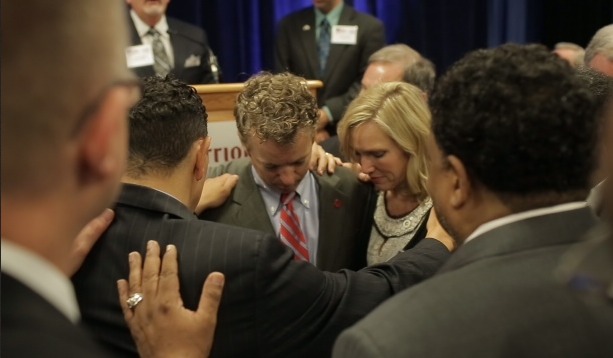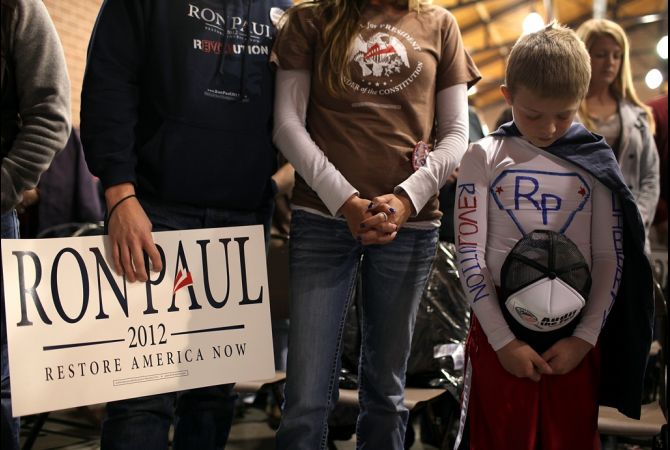It may not be a culture war, but religious conservatives and libertarians have often engaged in a war of words.
Videos by Rare
“We’re not the Libertarian Party, we’re the Republican Party,” Rick Santorum insisted last year, evincing disgust at the growing small-l libertarian presence in his socially conservative party.
The religious conservative who won the Iowa caucuses four years before Santorum did has long sounded a similar theme. “CPAC has becoming increasingly more libertarian and less Republican over the last years,” Mike Huckabee complained of the nation’s largest gathering of conservative activists, getting ready to kick off again in just a few days.
Libertarians are equally critical of religious conservatives. Reason editor Nick Gillespie worried in The Daily Beast that Rand Paul’s appeals to the Christian right would alienate libertarian-leaning voters, like Ronald Reagan saying “the very heart and soul of conservatism is libertarianism” in 1975, shortly before agreeing with Jerry Falwell on some social issues.

Ronald Reagan and Jerry Falwell
The journalist Mike Riggs, writing at the Reason site Gillespie edits, opined that religious conservatives “seem to think the real reason the GOP lost two presidential elections in a row is because its candidates did not talk enough about the horrors of abortion and men kissing each other on the mouth.” (Emphasis in the original.)
But religious conservatives and libertarians need to come together. The Christian right is increasingly losing the gay marriage debate, rapidly in the federal courts and more slowly in the court of public opinion. But they could soon lose their religious liberties too.
A photographer in New Mexico was found in violation of the law for declining to work a same-sex marriage ceremony on religious grounds. The state of Washington is coming after a florist who for similar reasons did not want to do the floral arrangement in a gay wedding ceremony. And a state judge ordered a Colorado baker to bake a wedding cake for a same-sex marriage despite religious objections.
When state legislatures in Arizona and Kansas tried to protect the religious freedoms of people of faith who find themselves in such situations, with bills that were admittedly politically tone-deaf and arguably overly broad, all hell broke loose.
As was the case with the ObamaCare contraception mandate, many liberals had little sympathy for arguments involving religious liberty.
“I guess I’m tired of religious groups operating secular enterprises (hospitals, schools),” wrote Mother Jones’ Kevin Drum, “hiring people of multiple faiths, serving the general public, taking taxpayer dollars — and then claiming that deeply held religious beliefs should exempt them from public policy.”
Slate’s Mark Joseph Stern goes a step further, describing religious-liberty arguments—implicitly excepted in the exemptions written into many democratically enacted state gay marriage statutes—as “disguising raw hatred as religious liberty.”
Most libertarians don’t agree with religious conservatives on gay marriage or contraception. (In fact, many religious conservatives have no moral qualms about contraception, save abortifacients.) But libertarians are strong believers in freedom of conscience and freedom of association, even in cases where those freedoms might be exercised in ways with they disagree personally.
Libertarians are a heavily, though far from uniformly, secular group of voters and thinkers who could be natural allies in defending the Christian right’s religious liberty. And if the mainstream commentary following the Kansas and Arizona bills was any indication, they need all the help they can get.
What do libertarians get out of the bargain? The Christian right has been a powerful force for prison reform since at least the 1990s, partly due to the influence of the late Chuck Colson. They are increasingly receptive to arguments for reforming harsh mandatory minimum sentences.
Religious conservatives are a large voting bloc that can help elect candidates who want to reform drug laws, address prison conditions, and generally shrink government. They can potentially be turned from the last major obstacle to Republicans pursuing a variety of policies that few Democrats can touch, for fear of being soft on crime—or national security.
Doubt me? Consider the role religious conservatives have played in supporting Rand Paul, Mike Lee, Justin Amash, and Thomas Massie, among others.

Senator Rand Paul and wife Kelley pray with evangelical ministers in Iowa. (Credit: Christian Broadcasting Network)
Considerable mutual distrust remains. The Federalist published a powerful essay about libertarians who don’t seem particularly interested in the religious freedoms of conservative Christians. Huckabee and Santorum are far more consequential social conservatives who have seemed at home with big government, as long as it is consistent with their values.
But religious traditionalists and libertarians have cooperated before. One example is the early conservative movement, through the oft-cited “fusionism” attributed to National Review senior editor Frank Meyer.
To Meyer, cooperation between libertarians and religious conservatives wasn’t just good politics. It was sound philosophy.
Meyer observed, “truth withers when freedom dies, however righteous the authority that kills it; and free individualism uninformed by moral value rots at its core and soon brings about conditions that pave the way for surrender to tyranny.”
I’m not sure whether to say “Yours in liberty” or “Amen.”


